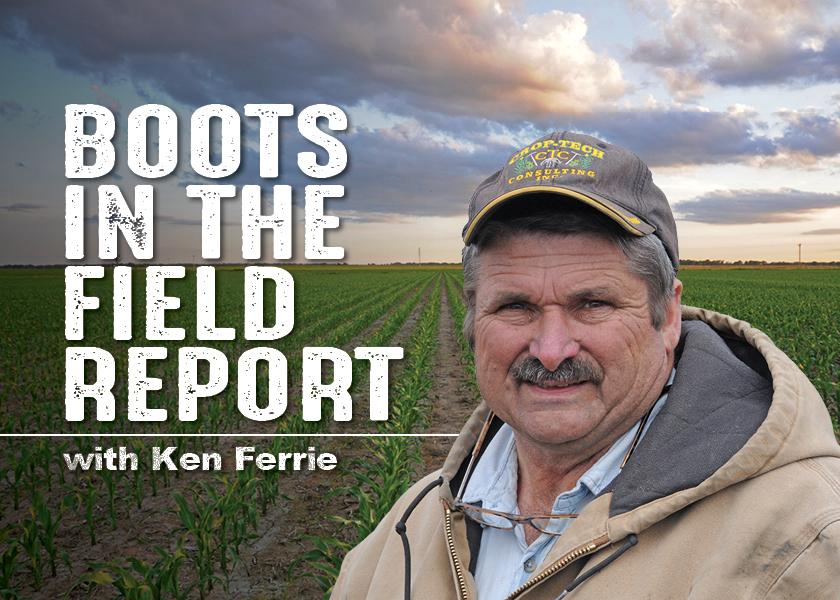Ken Ferrie: Scale Carts Are An Important Backup For Yield Monitors

With fall harvest underway, farmers throughout the Midwest are eyeing their corn yield results closely. In central Illinois, Ken Ferrie says he had several different conversations with growers this week as they compared hybrids and the yield swings they saw in yield monitors.
“They shared their frustration on how far off the yield monitor is on certain hybrids when the growers are taking out variety plots and comparing the monitor to the scale weights and what they thought was a well-calibrated combine. This is the reason why we run two scale carts here at Crop-Tech all fall long. Yield monitors are great tools, but they have their limits,” says Ferrie, Farm Journal Field Agronomist and owner of Crop-Tech Consulting near Heyworth, Ill.
Differences in a Monitor and Scale Cart Results Worth Evaluating
Ferrie offers an example based on a hybrid plot Agronomist Matt Duesterhaus harvested near Quincy, Ill., with a calibrated combine monitor.
Total percent error of all the weights in the plot was right at 1%, which Ferrie considers accurate.
“Anything under 3% I would consider to be excellent,” he says.
But when Ferrie looked at the individual hybrid weights, the monitor ranged from 10% higher than the scale for hybrid A to 6% under the scale for hybrid B. By monitor weights, hybrid A was 15 bushels better in yield than hybrid B. But when he scaled the weights, hybrid B was 18 bushels better than hybrid A.
“Now these are the extremes in this plot, but that is the exact reason you need a scale cart to back-up monitors when you do any type of plot work,” Ferrie says. “Calibrated monitors usually do a good job of telling you where the yield is changing in a field within a hybrid, but they may not tell you exactly how one hybrid is yielding against another.”
Hybrid Comparisons to Soil Types and Zones
One corn grower asked Ferrie this week whether he and his agronomic team can compare hybrids to soil types and zones this fall to see which hybrids do the best in each soil type. The short answer is yes, he said.
Crop-Tech agronomists can run queries for their farmer customers and have them ready for their yield map meetings. But, Ferrie says there are some things farmers must do to make them meaningful.
First, are the varieties correctly labeled in your monitor on every field?
Second, when you're in that variety harvesting, he says to start a new load on the monitor and get a scale cart weight or semi weight of that variety (and don't forget move to another load in the monitor when you finish).
“When you send in your yield map data, send in those weights as well as tell us which loads they correspond to,” Ferrie says. “Our crew will go in and scale that load to an actual weight and use that data to scale that variety to a more accurate yield. Once we have the variety scale, we can then scale the total field to your settlement sheet. This will give you a more accurate feel for how these varieties yielded by soil type.”
Crop-Tech Consulting customers will want to listen to Ferrie’s podcast below to get the full details on this service. You can also call his office to get help from one of the agronomists.
Stay on Top of Harvest and Lime Needs
Ferrie shared three additional pointers for farmers during this week’s podcast:
1. Scouts need to continue doing the stalk push test as harvest season grinds on, and combine operators need to keep checking harvest loss.
“This should be done at least once a day if not for each hybrid or bean variety that you're combining,” he says. “After you use your harvest squares enough checking for loss, you will get a good feel for it you will walk behind that combine and decide if your losses are too high.”
2. Check out whether lime is available. Ferrie says he is getting a lot of reports of quarries running out of lime. So don't take that for granted. “If the lime has not dumped already, check on the availability of it,” he says.
3. Plot harvest continues, and the results from the six flex plots done near Reinbeck, Iowa, near Cedar Falls.
The plot had 18 hybrids in it, planted in 24,000 and 36,000 populations. The 24,000 planted population yields ranged from 195 to 264 bushels. The 36,000 planted population yields ranged from 216 to 253 bushels.
“Of the 18 hybrids in that plot, nine of them cash-flowed best at 24,000,” Ferrie says. “We'll take a deep dive into these plots when we do the hand harvest in November so we can get that prepared for customer hybrid yearbooks.”
You can hear the complete podcast here:







